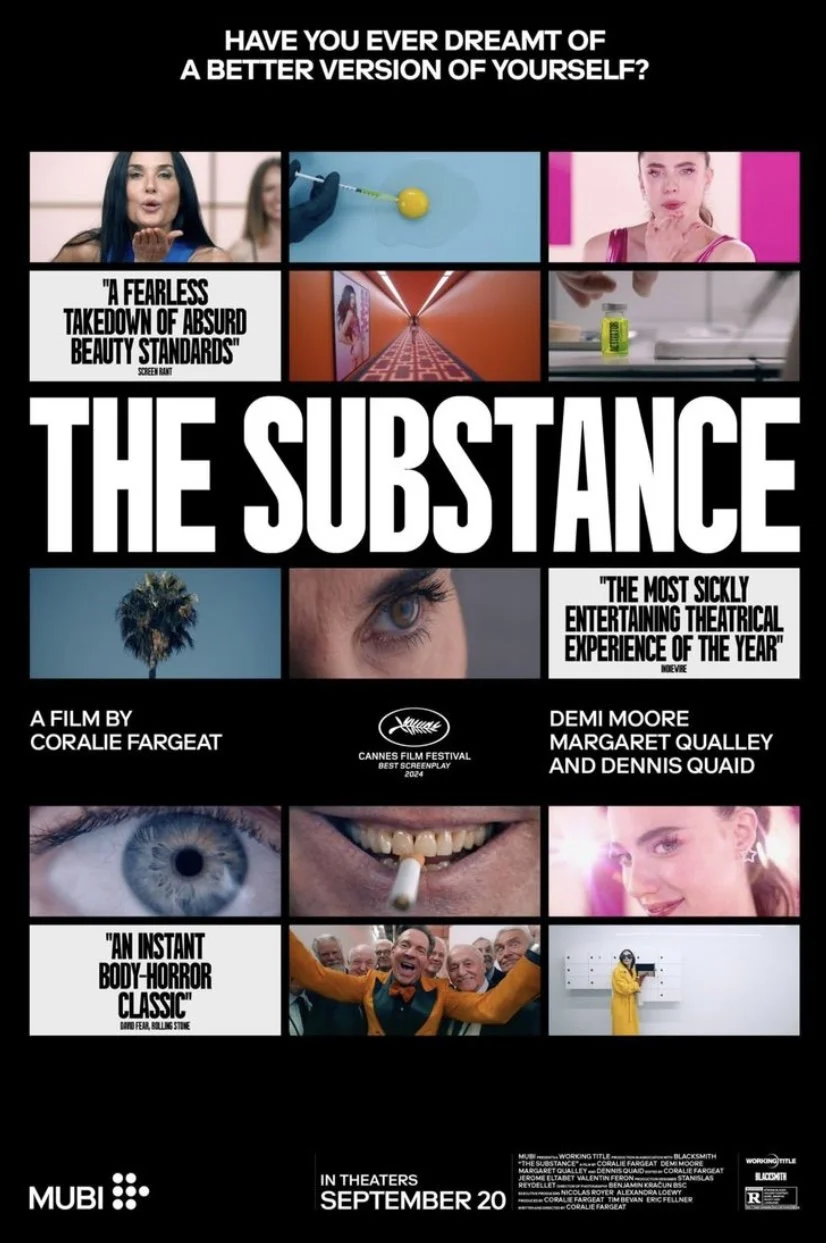“THE SUBSTANCE”: EXPLORING A MOVIE THAT MISSES ITS MARK
★★★☆☆☆☆☆☆☆ (3/10)
Take a bit of The Picture of Dorian Gray by Oscar Wilde, mix it with Alien by Ridley Scott and Carrie by Brian De Palma, blend it all together, and you get The Substance. The result is a stew that, while intriguing in concept, fails to fully satisfy.
The Substance tackles an interesting theme—one that resonates particularly in the Californian beauty industry obsessed with perfection at any cost. It transforms this theme into a film that’s hard to categorize, straddling the lines between psychological drama, horror, splatter, and little else. The movie holds interest but ultimately fails to take off.
As mentioned earlier, this film attempts to mix a theme as old as time—eloquently explored by Wilde—with echoes of Brian De Palma and early Ridley Scott. However, it struggles to blend these influences into a cohesive identity or a standout film of the year. It doesn’t succeed; on the contrary, it leaves viewers disappointed, particularly given the much-anticipated return of Demi Moore. While Moore’s performance deserves praise—an eight, perhaps—the film itself falters considerably.
It’s hard to understand why a director who experiments with daring ideas and occasionally intriguing cinematography couldn’t provide the film with a unique identity, relying instead so heavily on tropes from past movies. The shifts in pacing and genre throughout the film—a hallmark of Brian De Palma’s mastery—require an artistry that must be meticulously crafted, which is no easy feat.
For those intrigued by the fantasy of eternal youth and its obsessive, possessive allure, alongside the psychological consequences that can trap, condemn, or curse us while potentially offering peace, the film may still be worth watching. Personally, I’d give it a low score—a mere 3/10—because it lacks the originality, uniqueness, and innovation we expect from films that tackle such fundamental aspects of the human soul.
For the American audience, The Substance may hold more appeal, and its box office success will likely reflect that. This is in stark contrast to Joker 2, a masterpiece that wasn’t proportionately appreciated in the U.S. compared to the rest of the world, which often gravitates toward subtler, less graphic works.
A final note of praise goes to the standout performance by Dennis Quaid. These moments, along with Moore’s direction, are among the few redeeming aspects of the film. Particularly memorable is a pivotal scene where the protagonist encounters another victim of the mirage of eternal beauty. This meeting, casual yet meaningful, serves as a reminder of the process of self-acceptance and embracing who we are. The dialogue—“It gets harder each time, to remember that you still deserve… to exist! That this part of yourself is still worth something! That you still matter!”—stands out for its emotional weight.
However, despite the scene’s charm and its exploration of acceptance, the theme ultimately feels overly simplistic and lacks depth. The meditation on self-worth and the cost of pursuing perfection fails to rise above the banal. Final score: 3/10.
To see more visit The Opinion.


